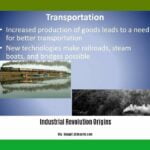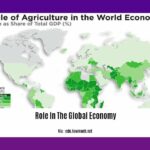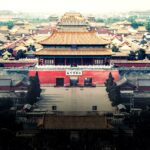The Industrial Revolution’s Enduring Impact on Society and Economy: Unveiling the Profound Transformations Sparked by Technological Advancements.
Key Takeaways:
- Technological advancements led to increased production and new tasks.
- Capitalism and modern cities emerged due to factory systems.
- The Industrial Revolution sparked social movements (e.g., socialist, labor, feminist).
- Western countries experienced significant economic growth.
- Reliance on agriculture decreased as industrialization progressed.
Industrial Revolution impact
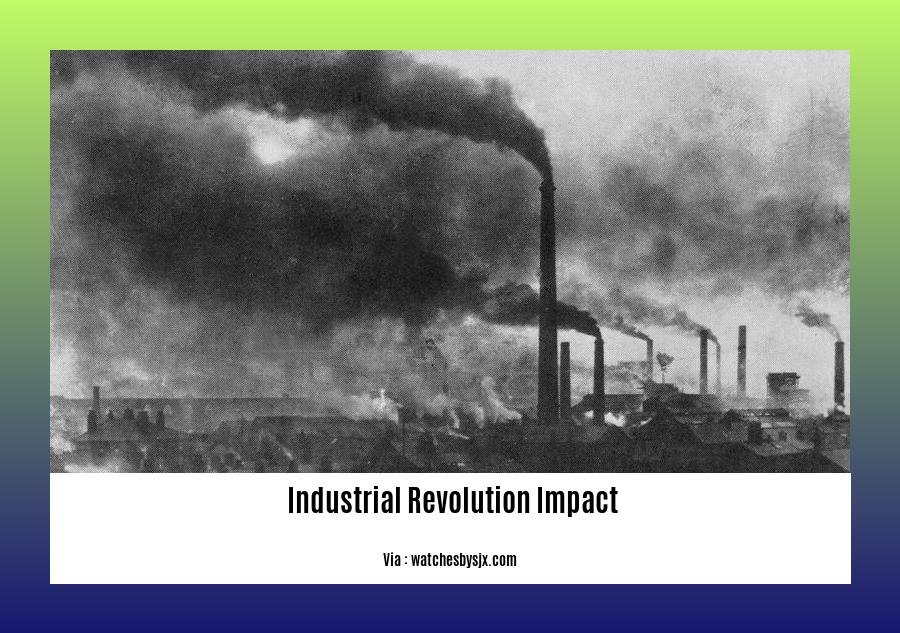
The Industrial Revolution was a transformative period that marked a significant departure from traditional modes of production and ushered in an era of unprecedented technological advancement. Its profound impact on societies and economies continues to resonate today.
Technological Advancements
The Industrial Revolution was characterized by the emergence of groundbreaking machines and processes that revolutionized industries. Steam engines, spinning jennies, and power looms, to name a few, dramatically increased production capacities and introduced new capabilities.
Socioeconomic Changes
The Industrial Revolution spurred significant socioeconomic changes. The factory system, which brought together workers in centralized locations, gave rise to industrial capitalism and modern cities. However, it also led to concerns about working conditions, child labor, and the erosion of traditional social structures.
Global Consequences
The Industrial Revolution had far-reaching global consequences. It propelled Western countries into a period of economic growth, leading to the expansion of trade and the emergence of global markets. However, it also contributed to environmental degradation and the displacement of indigenous populations.
Enduring Legacy
The Industrial Revolution left an enduring legacy on modern society. Its technological innovations laid the foundation for subsequent technological advancements, while its socioeconomic changes shaped the labor movement, urbanization, and social welfare systems.
Long-Term Implications
The Industrial Revolution continues to influence contemporary issues. The rise of automation and artificial intelligence, for example, echoes the transformative nature of earlier technological advancements. Understanding its long-term implications can help us navigate the challenges and opportunities of the modern era.
- Delve into the multifaceted chronicle of Europe’s past by exploring our comprehensive guide on the History of Europe
- Understand the transformative era that shaped Europe’s cultural landscape with our in-depth examination of The Renaissance in Europe.
- Uncover the origins and evolution of one of the world’s most influential political and economic entities in our detailed analysis of European Union Formation.
Social and economic impacts
The Industrial Revolution marked a pivotal moment in human history. This transformative era brought about profound social and economic impacts that shaped the world as we know it today.
Urbanization: The Industrial Revolution saw a mass migration from rural areas to cities, as people sought work in factories. This led to the growth of densely populated urban centers, with all their attendant problems (pollution, crime, and poverty).
New social classes: The Industrial Revolution created new social classes, such as the working class and the middle class. The working class consisted of factory workers who lived in poverty and had little power or security. The middle class consisted of people who owned businesses or worked in professions, such as doctors and lawyers.
Economic growth: The Industrial Revolution led to a period of unprecedented economic growth. New technologies, such as the steam engine and the cotton gin, increased productivity and led to a surge in the production of goods.
Increased inequality: The Industrial Revolution also led to increased inequality, as the wealthy owners of factories and mines grew richer while the working class remained poor.
Environmental problems: The Industrial Revolution also had a negative impact on the environment. Factories polluted the air and water, and the burning of fossil fuels led to climate change.
Key Takeaways:
– The Industrial Revolution led to a mass migration from rural to urban areas.
– The Industrial Revolution created new social classes, such as the working class and the middle class.
– The Industrial Revolution led to a period of unprecedented economic growth.
– The Industrial Revolution also led to increased inequality.
– The Industrial Revolution had a negative impact on the environment.
Citations
The Social Impact of the Industrial Revolution
Industrial Revolution | Causes & Effects
Environmental consequences
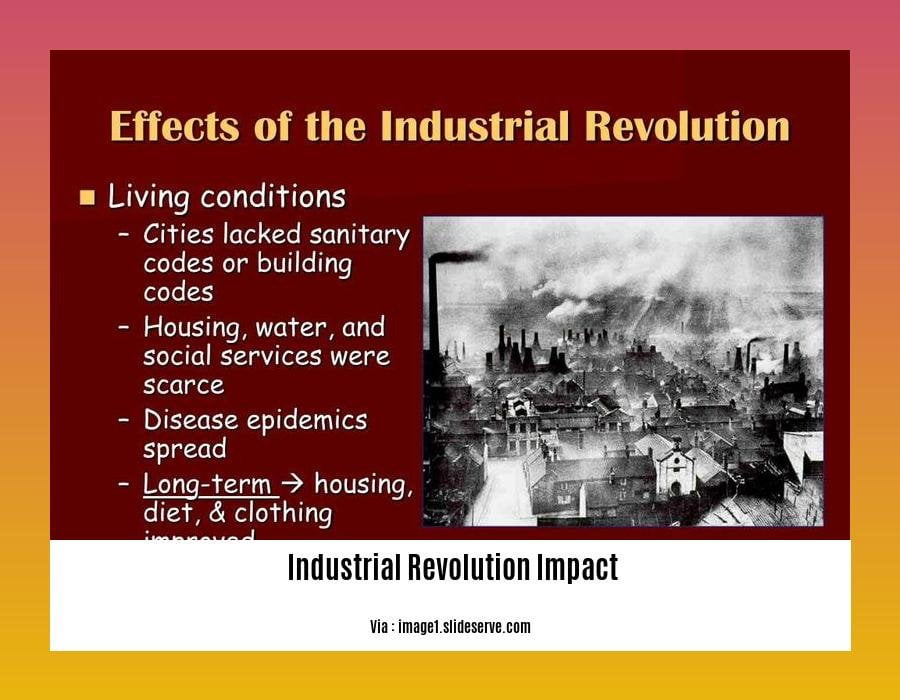
The Industrial Revolution brought about unprecedented technological advancements, but it also left a lasting impact on the environment. The rapid industrialization and urbanization led to various environmental challenges that continue to affect us today.
The dark side of progress
The burning of fossil fuels to power factories and transportation systems resulted in significant air pollution. Emissions from industries, vehicles, and power plants released harmful gases into the atmosphere, contributing to smog and respiratory issues.
Industrial waste, runoff from agricultural practices, and sewage discharge contaminated waterways, leading to water pollution. This had detrimental effects on aquatic ecosystems, harming wildlife and human health.
Industrial processes also released chemicals, pesticides, and heavy metals into the environment, causing soil pollution. These pollutants affected soil fertility and could enter the food chain, posing risks to human and animal health.
The increased demand for raw materials during the Industrial Revolution led to resource depletion. Forests were cleared for timber and agriculture, while minerals and other resources were extracted at unsustainable rates.
The release of greenhouse gases from industries contributed to climate change. The burning of fossil fuels emitted carbon dioxide and other greenhouse gases, which trap heat in the atmosphere and contribute to global warming.
Industrial development often encroached on natural habitats, resulting in habitat destruction. The clearing of forests and other natural areas displaced wildlife and disrupted ecosystems.
Key Takeaways:
- The Industrial Revolution had severe environmental consequences due to air pollution, water pollution, soil pollution, resource depletion, climate change, and habitat destruction.
- These environmental challenges continue to impact us today and require attention and action to mitigate their effects.
- Balancing economic progress with environmental sustainability is crucial for the well-being of present and future generations.
Relevant Sources:
- Environmental Impact Of The Industrial Revolution – TRVST
- What was the Industrial Revolution’s Environmental Impact?
Long-term implications
The Industrial Revolution left an indelible mark on the world. It sparked an unprecedented surge in productivity and economic growth, but it also brought about profound social and environmental transformations. The long-term implications of this era continue to shape our lives today.
Socioeconomic Impacts
The Industrial Revolution ushered in a new era of capitalism and consumerism. The factory system, mass production, and the division of labor led to an explosion of goods and services. This, in turn, fueled urbanization and the growth of cities. However, the rapid industrialization also brought with it challenges such as pollution, inequality, and labor unrest.
Technological Advancements
The Industrial Revolution was a period of rapid technological innovation. Steam engines, power looms, and other inventions transformed manufacturing and transportation. These advances laid the foundation for the modern technological society we live in today. However, the relentless pursuit of technological progress also raises questions about its impact on the environment and our way of life.
Environmental Consequences
The Industrial Revolution had a profound impact on the environment. The burning of fossil fuels, deforestation, and industrial pollution led to widespread environmental degradation. These problems continue to challenge us today, as we grapple with climate change and other environmental crises.
Key Takeaways:
- The Industrial Revolution was a period of rapid technological innovation, socioeconomic change, and environmental transformation.
- The long-term implications of the Industrial Revolution continue to shape our lives today, from the way we work and live to the environmental challenges we face.
- Understanding these long-term implications is crucial for navigating the complex challenges of the 21st century.
Relevant URLs:
- The Long-Term Effects of the Industrial Revolution
- Industrial Revolution | Britannica
FAQ
Q1: What significant technological advancements emerged during the Industrial Revolution?
A1: The Industrial Revolution introduced transformative technologies, such as the steam engine, power loom, and cotton gin, which revolutionized manufacturing and transportation.
Q2: How did the Industrial Revolution impact urbanization?
A2: The factory system led to increased urbanization as workers migrated from rural areas to industrial cities, resulting in the growth of densely populated urban centers.
Q3: What social movements were sparked by the Industrial Revolution?
A3: The Industrial Revolution gave rise to various social movements, including labor unions, socialist organizations, and feminist groups, which sought to improve working conditions, address social inequality, and advocate for women’s rights.
Q4: How did the Industrial Revolution transform the global economy?
A4: The Industrial Revolution fueled significant economic growth in Western countries and initiated global trade networks, leading to increased international interdependence and the emergence of new economic powers.
Q5: What were some of the negative environmental consequences of the Industrial Revolution?
A5: The Industrial Revolution brought about environmental challenges, such as increased air and water pollution, soil degradation, and habitat destruction, as a result of rapid industrialization and urbanization.

